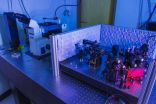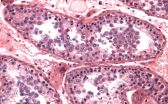Producing fuel from Canada oil sands emits more carbon than from US crude
2015-07-01
(Press-News.org) The production of petroleum from Canada's oil sands is on the rise with much of it destined for U.S. refineries. As the U.S. takes stock of its greenhouse gas emissions, scientists report in the ACS journal Environmental Science & Technology that the current oil sands production of fuels from "well-to-wheels" releases about 20 percent more carbon dioxide into the atmosphere than making gasoline and diesel from conventional crudes.
In 2013, the oil industry was producing nearly 2 million barrels per day from Canadian oil sands. By 2030, that number is expected to rise to just over 4.8 million barrels per day. Studies have estimated the impact of oil sands on greenhouse gas emissions, but the figures have ranged widely, depending on several factors such as the extraction method and refining efficiency. Hao Cai and colleagues wanted to come up with a more detailed assessment.
To calculate the carbon footprint of fuels from Canadian oil sands, the researchers took a more comprehensive approach and incorporated in their formula recent technological upgrades designed to reduce greenhouse gas emissions. Despite the upgrades, they found that gasoline and diesel from Canadian oil sands still released 18 percent and 21 percent more carbon, respectively, into the atmosphere than those same fuels from conventional crude oils that come from U.S. sources.
INFORMATION:
The authors acknowledge funding from the U.S. Department of Energy.
The American Chemical Society is a nonprofit organization chartered by the U.S. Congress. With more than 158,000 members, ACS is the world's largest scientific society and a global leader in providing access to chemistry-related research through its multiple databases, peer-reviewed journals and scientific conferences. Its main offices are in Washington, D.C., and Columbus, Ohio.
To automatically receive news releases from the American Chemical Society, contact newsroom@acs.org.
Follow us: Twitter Facebook
ELSE PRESS RELEASES FROM THIS DATE:
2015-07-01
JILA researchers have designed a microscope instrument so stable that it can accurately measure the 3D movement of individual molecules over many hours--hundreds of times longer than the current limit measured in seconds.*
The technology was designed to track the machinery of biological cells, down to the tiniest bits of DNA, a single "base pair" of nucleotides among the 3 billion of these chemical units in human genes. But the instrument could be useful well beyond biology, biochemistry and biophysics, perhaps in manufacturing.
JILA is a partnership of the National ...
2015-07-01
GRAND RAPIDS, Mich., June 24, 2015 - Researchers at Spectrum Health Helen DeVos Children's Hospital have completed the first clinical trial of a new treatment for children suffering from neuroblastoma. In a clinical trial led by Giselle Sholler, MD, pediatric oncologist at Helen DeVos Children's Hospital and the Neuroblastoma and Medulloblastoma Translational Research Consortium (NMTRC), DFMO, an investigational agent, showed minimal side effects with long-term survival of three patients. This is the first clinical study of an oral dosing form of DFMO in any pediatric population. ...
2015-07-01
Scientists have at their disposal a way to explore the possible prevention of genetic diseases before birth. But should they? Currently, the most promising path forward involves editing the genes of human embryos, a procedure rife with controversy. An article in Chemical & Engineering News (C&EN), the weekly newsmagazine of the American Chemical Society, parses the explosive issue.
Britt E. Erickson, a senior editor at C&EN, reports that at least one team of scientists has already published a study on altering disease-related genes of human embryos. The experiment was ...
2015-07-01
In the most severe form of male infertility, men do not make any measurable levels of sperm. This condition, called azoospermia, affects approximately 1 percent of the male population and is responsible for about a sixth of cases of male infertility.
Oftentimes men with azoospermia don't know the underlying cause of their condition. But new research led by University of Pennsylvania scientists suggests that mutations in an X chromosome gene called TEX11 are responsible for a significant number of cases of infertility -- an estimated 1 percent of cases of non-obstructive ...
2015-07-01
Complex magnetic structures are at the heart of promising new materials for devices in "spintronics", a field of research aiming at more energy efficient data storage and processing. A prominent example is the so-called spin valve, where the magnitude of the electrical current passing through a device is very sensitively dependent on its magnetic configuration. These configurations can be readily controlled by a magnetic field in artificial layer systems, resulting in the giant magnetoresistance effect (GMR), a discovery rewarded with the 2007 Noble price in physics to ...
2015-07-01
College Park, Md. -- Extreme heat and precipitation events, which are expected to increase in frequency and intensity due to climate change, are associated with increased risk of Salmonella infections, according to a study led by researchers from the University of Maryland School of Public Health. The study is the first to provide empirical evidence that Salmonella infections related to extreme weather events are disproportionately impacting those living in the coastal areas of Maryland.
"We found that extremely hot days and periods of extreme rainfall are contributing ...
2015-07-01
When ecologists gather in Baltimore, Md., this August for the 100th Annual Meeting of the Ecological Society of America, special attention will fall on the local Chesapeake Bay watershed, with field trips and research presentations exploring its rich wildlife and social history. At symposia, poster exhibits, and site visits, ecologists will have opportunities to discuss the latest research and experiences working with stakeholders in the region to improve the health of the nation's largest estuary.
Chesapeake Bay bears a heavy pollution burden from the growing metropolitan ...
2015-07-01
PHILADELPHIA - Despite findings of previous studies and published guidelines, nearly two-thirds of patients with T4a larynx ("voice box") cancer are not receiving a total laryngectomy (surgical removal of the larynx), the recommended form of treatment, and as a result, have significantly worse survival rates versus those treated with a total laryngectomy, a new study published in the International Journal of Radiation Oncology, Biology and Physics by experts at Penn Medicine found. Patients who underwent a laryngectomy, on average, lived nearly two years longer than those ...
2015-07-01
From today (1 July 2015) The BMJ requires sharing of individual patient data for all clinical trials.
This means that trials will be considered for publication only if the authors agree to make the relevant anonymised patient level data available on reasonable request.
The BMJ is the first general medical journal to require data sharing for all trials, extending its initial policy on sharing data for trials of drugs or devices, which took effect in January 2013, says Elizabeth Loder, The BMJ's acting head of research.
In an editorial to mark the launch of the new ...
2015-07-01
The stress hormone cortisol strengthens memories of scary experiences. However, it is effective not only while the memory is being formed for the first time, but also later when people look back at an experience while the memory reconsolidates. This has been published by cognition psychologists from the Ruhr-Universität Bochum in the journal "Neuropsychopharmacology". They suggest that the results might explain the persistence of strong emotional memories occurring in anxiety and Post-Traumatic Stress Disorder (PTSD).
Memories of emotional experiences usually fade ...
LAST 30 PRESS RELEASES:
[Press-News.org] Producing fuel from Canada oil sands emits more carbon than from US crude


